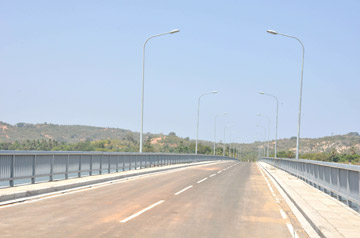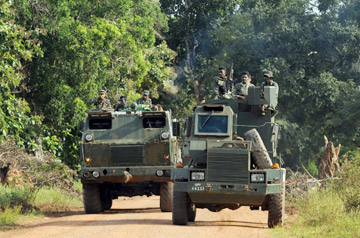|
Opinion: New style of media freedom:
How Britain took Guardian editor to task
By K.M.H.C.B. Kulatunga
Certain members of the British Parliament – the House of Commons,
often discuss matters pertaining to Sri Lanka as if they don’t have any
other domestic issues to discuss. If not, they must still be assuming
that Sri Lanka is still a British colony or a County in the UK.

The rebuilt Kiniya bridge. |

Buffels in operation against Tiger terrorists. (File photo) |
Following Cameron’s undiplomatic remarks during the Commonwealth
Summit, it has now become customary for the Britain make various
statements on Sri Lanka at regular intervals. In its latest remark on
Sri Lanka, the Britain has said that it would
continue to discuss on the situation in Sri Lanka, including human
rights issues with a range of other European Union, Commonwealth and
international partners over the coming months.
In response to a question by a British Parliamentarian, the Minister
of State, Foreign and Commonwealth Office Hugo Swire told British
Parliament that, “The UK has been voted back on to the Human Rights
Council and will play an active role in building international support
ahead of the March Human Rights Council session. We will continue to
discuss Sri Lanka with a range of other EU, Commonwealth and
international partners over the coming months”.
He also said that Cameroon was clear that the UK “expect real
progress on human rights, reconciliation, accountability, and political
settlement. The Human Rights Council will assess progress in March.”
Crocodile tears
What perturbs us is the extraordinary hurry and concern shown by
Cameron. Is it to satisfy the Tamil Diaspora and secure their votes
ahead of the British parliamentary elections scheduled for 2015? This
idea expressed by none other than Sri Lanka’s High Commissioner to the
UK Dr. Chris Nonis could be the main reason that has prompted Britain to
shed crocodile tears.
First and foremost, the Britain has no moral right to level war
crimes allegations on Sri Lanka. If they really want to do that, they
must first have a credible investigation to the countless number of
human rights violations and war crimes committed by the British Forces
in invading Sri Lanka.
It is well-known how the British Forces indiscriminately killed
thousands of Sri Lankans in 1818. On the other hand, Britain does not
practice what it preaches. They pontificate us on media freedom but take
a different approach in dealing with British media. The most recent and
classic example is the stunning disclosure by none other than the Editor
of the Guardian newspaper.
Cameron used the CHOGM 2013 in Sri Lanka, to project him and his
British regime as the paragon of virtue of media freedom among other
sacred rights.
His style of media freedom was evident the manner in which he faced
the final news conference in Colombo. A team of ‘exclusive’ media
persons of his choice arrived at the press conference room with him and
occupied the ‘reserved’ front row seats. Except for one local journalist
of their choice, it was all these media favourites seated in reserved
seats who had the fortune of asking questions from Cameron.
Explanations
Cameron got his governing coalition acolytes to do just the opposite:
haul the widely read London-based newspaper The Guardian to the House of
Commons for exercising its sacred right of media freedom.
The British Government appeared to be infuriated with the Guardian
for publishing classified documents of USA's covert surveillance and
eavesdropping of ‘activities’ in the ‘Global Theater’ provided by the
former (US) National Security Agency contractor Edward Snowden since
June this year.
The British authorities called explanations from the Guardian for
jeopardizing national security. The Guardian’s senior editor, Alan
Rusbridger, was forced to appear before a parliamentary committee last
Tuesday, to give explanation about the newspaper’s actions.
This follows the order by the British officials to destruct hard
drives at the Guardian’s London headquarters. Even top ministers have
taken to the airwaves to denounce the newspaper. Scotland Yard has also
suggested it may be investigating the paper for possible breaches of
British law.
It is still fresh in our minds the way some of the Western countries,
including Britain, had preached us as the godfathers of media freedom
when there had been an isolated incident in Sri Lanka. But the British
Prime Minister seems to be having his own style of safeguarding media
freedom.
Small but mighty
This was how the Washington Post wrote: “Living in self-imposed exile
in Russia, former National Security Agency contractor Edward Snowden may
be safely beyond the reach of Western powers. But dismayed by the
continued airing of trans¬atlantic intelligence, British authorities are
taking full aim at a messenger shedding light on his secret files here -
the small but mighty Guardian newspaper”.
Unlike in the US, Britain has no enshrined constitutional right to
free speech. But in the US, the freedom is guaranteed in the First
Amendment to the constitution. But Britain which is supposed to be the
‘mother of all freedoms’, seems to be practicing its own style of media
freedom.
The unethical actions of the British government against Guardian have
led to growing concern in Britain and beyond. The UN special rapporteur
on free expression, Frank La Rue, has denounced the Guardian’s treatment
as “unacceptable in a democratic society.” The World Association of
Newspapers and News Publishers, a Paris-based trade association, will
send a delegation of “concerned” publishers and editors from five
continents to London in January on a “UK press freedom mission.”
Under pressure
Over 70 leading human rights organizations in the world have written
to Cameron to warn that the British government's reaction to the mass
surveillance revealed by Edward Snowden is leading to an erosion of
fundamental rights and freedoms in the UK.
Hauled before the British House of Commons to answer the allegation
as to why The Guardian newspaper published US National security Agency
classified surveillance and eavesdropping disclosed by Edward Snowden,
Guardian editor Alan Rusbridger said his newspaper had been put under
the kind of pressure to stop publishing stories that would have been
inconceivable in other countries.
“They include prior restraint; they include a senior Whitehall
official coming to see me to say: ‘There has been enough debate now'.
They include asking for the destruction of our disks. They include MPs
calling for the police to prosecute the editor. So there are things that
are inconceivable in the US. I feel that some of this activity has been
designed to intimidate the Guardian,” he said.
The Guardian has published a series of stories about the mass
surveillance techniques of GCHQ and its US counterpart, the NSA, over
the last six months; two of the most significant programs uncovered in
the Snowden files were Prism, run by the NSA, and Tempora, which was set
up by GCHQ. Between them, they allow the agencies to harvest, store and
analyze data about millions of phone calls, emails and search-engine
queries.
'Staggering' scale
As a result, the Guardian has come under intense pressure and
intimidation designed to stop it from publishing stories of huge public
interest that have revealed the “staggering” scale of Britain's and the
USA’s secret surveillance programs, the editor-in-chief of the newspaper
has said.
Rusbridger, giving evidence to a parliamentary committee about
stories based on the National Security Agency leaks from the
whistle-blower Edward Snowden, said the Guardian “would not be put off
by intimidation, but nor are we going to behave recklessly”.
Rusbridger's answers referred to comments made to a parliamentary
committee last month by the chiefs of Britain's three intelligence
agencies – Sir Iain Lobban, the director of GCHQ, Andrew Parker, the
director general of MI5, and Sir John Sawers, chief of MI6. The men had
claimed that the Snowden revelations had damaged national security and
that terrorists were likely rubbing their hands in glee.
Rusbridger said that it is important that the editors of the world's
leading newspapers take virtually identical decisions. “This is not a
rogue newspaper. It is serious newspapers that have long experience of
dealing with national security,” he added.
Testimony
He told British MPs that disclosures from the files had generated a
global debate about the powers of state agencies, and the weaknesses of
the laws and oversight regimes they worked within. “In terms of the
broader debate, I can't think of a story in recent times that has
ricocheted around the world like this has and which has been more
broadly debated in parliaments, in courts and amongst NGOs,” the Editor
of the Guardian had said.
There is no doubt that the Guardian Editor's testimony before the
House of Commons is an impeachment on Cameron's attitude toward media
freedom in Great Britain. Instead of meddling with internal affairs of
other sovereign states, Cameron must clear the garbage in his own
backyard.
All these things have been said in good faith, while respecting
Britain’s sovereignty as an independent nation. Similarly, Britain must
also respect sovereignty and territorial integrity of all other
independent states, irrespective of their extent or wealth.
As we have pointed out regularly, Sri Lanka needs true friends, not
self-appointed arbitrators or judges.
It is better that the countries which tell all the things on earth to
countries such as Sri Lanka practice what they preach. |

